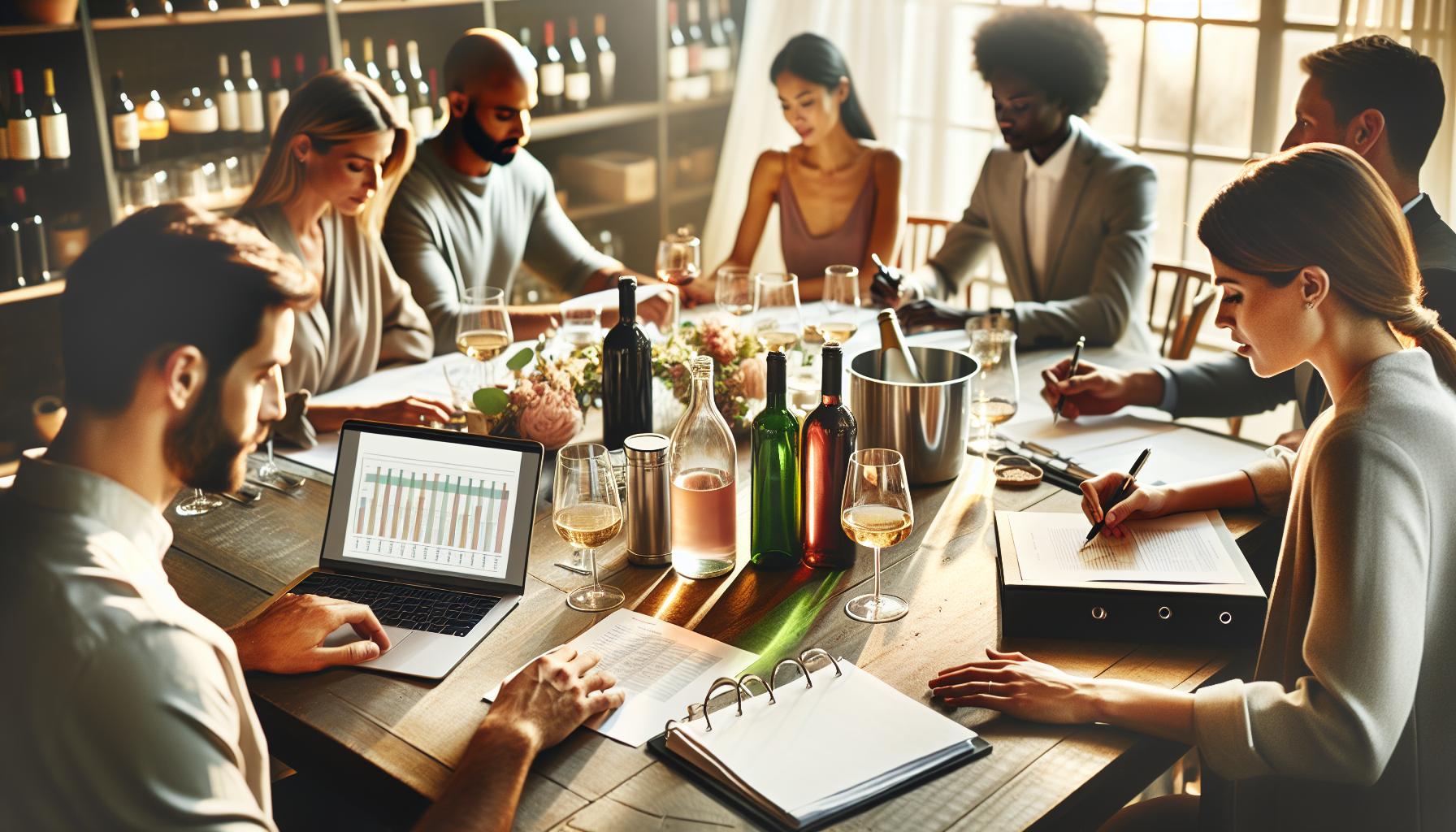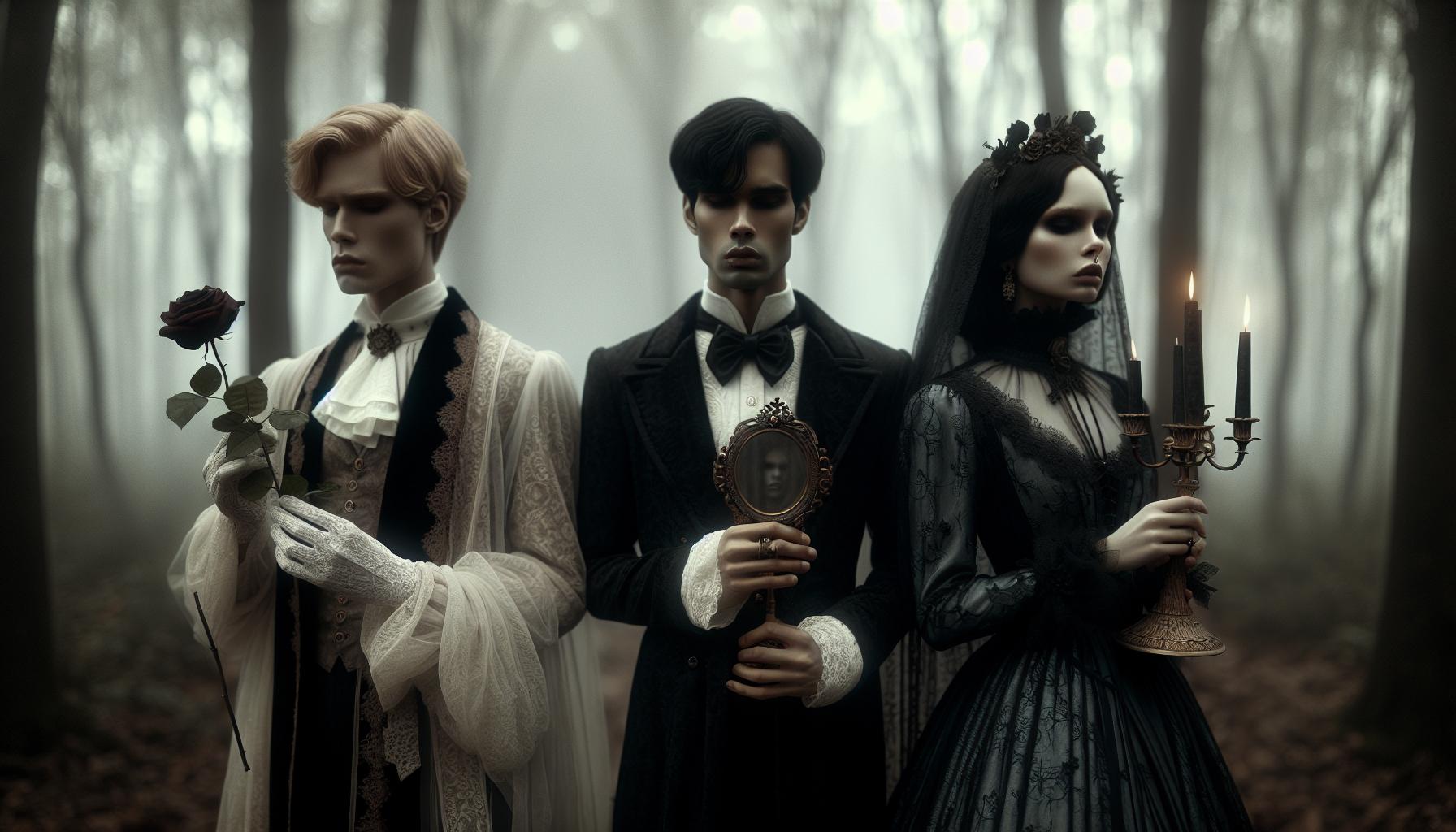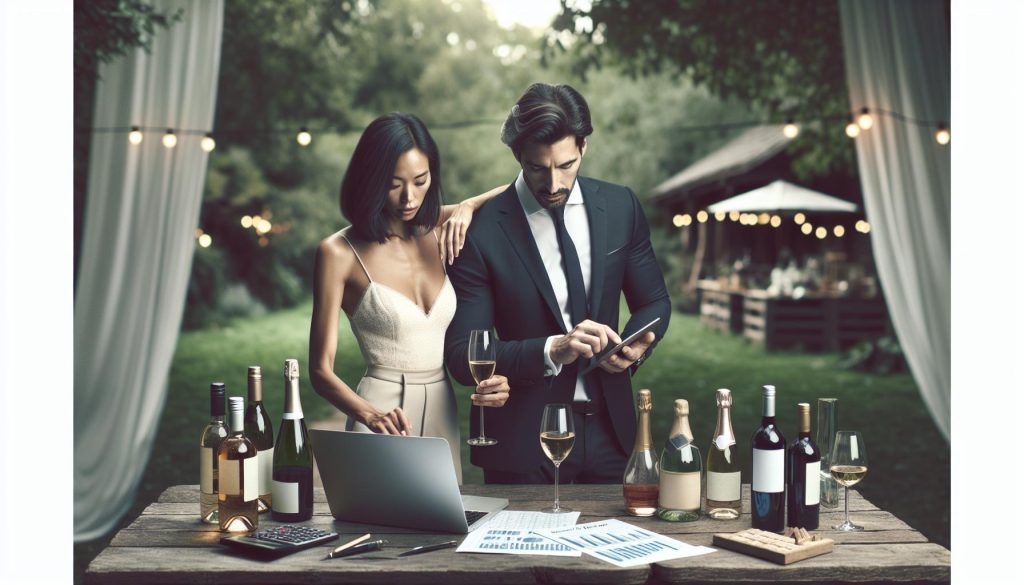Planning a wedding is an enchanting journey filled with excitement, but it can also come with its share of challenges-especially when it comes to figuring out how much alcohol to buy for your celebration. Did you know that a well-planned bar can enhance the mood and ensure your guests have a memorable time? Understanding the right quantities based on your guest list, event duration, and preferences is crucial. Whether you envision a laid-back evening with craft beers or a lavish affair featuring fine wines and signature cocktails, our wedding alcohol calculator makes this intricate task manageable. Say goodbye to guesswork and hello to a beautifully stocked bar that allows you to celebrate love with confidence. Let’s dive into how this handy tool can turn your beverage planning from overwhelming to effortless, ensuring your wedding day is both joyous and stress-free.
How to Estimate Alcohol Quantities for Your Wedding
Estimating the right amount of alcohol for your wedding can feel daunting, but it doesn’t have to be! With a little pre-planning and the help of a few formulas, you can ensure that your guests are happily toasting your love story without any awkward moments of running dry or excess. Typically, you’ll want to plan for approximately one drink per guest for the first hour of your reception and then half a drink for each subsequent hour. This approach offers a solid foundation while factoring in your guests’ drinking habits.
To get more specific, consider the types of alcohol you’ll serve. A standard guideline is to allocate around 50% beer, 30% wine, and 20% liquor. However, this can vary based on your audience. For example, if you know you have a lot of wine enthusiasts, you might increase the wine portion accordingly. Additionally, special considerations should be made for signature cocktails that could replace standard liquor offerings, or themed drinks that resonate with your celebration.
Another useful tip is to account for the duration of your celebration. The longer your event, the more alcohol you may need; thus, it’s wise to include additional bottles in cases of prolonged festivities or lively dancing. Use an alcohol calculator to simplify this process-these tools can provide exact numbers based on guest count, duration, and your chosen selections. By combining these strategies, you can confidently create a well-stocked bar that keeps the love flowing throughout your joyful day.
Understanding Your Guest List and Drinking Preferences
Getting the numbers right for your wedding can feel a bit like preparing for a grand feast-you want to ensure that every guest feels catered to and has a delightful experience. One crucial aspect of this is understanding your guest list and their drinking preferences. Your friends and family are the heart of your celebration, and knowing their tastes can help you tailor the bar offerings to their liking, ensuring that everyone raises a glass to your love story.
Start by assessing the composition of your guest list. Are you inviting a group that typically enjoys cocktails over wine? Or do you have a balance of craft beer enthusiasts and champagne lovers? Consider sending a casual survey or asking your friends and family about their drink preferences in conversations leading up to the big day. This can help you gauge whether to lean more heavily on beer, wine, or liquor. Additionally, weddings often attract a mix of ages and backgrounds, which can influence drink choices significantly. Aim for a balance that resonates with your guests while also reflecting your own tastes as a couple.
It’s also helpful to reflect on any previous gatherings you’ve hosted. Remember which drinks were popular and which were left untouched? Using these past experiences can provide valuable insights into what your guests might prefer. Combining this knowledge with the percentages mentioned earlier-typically 50% beer, 30% wine, and 20% liquor-can serve as a great starting point. As you build your beverage menu, don’t forget to incorporate potential signature cocktails that highlight your personalities or story together; these can add a personal touch and spark up conversations among guests.
Lastly, be conscious of the overall atmosphere you want to create. A lively celebration might call for a more diverse selection of cocktails and spirited drinks, while a romantic, intimate gathering might flow better with fine wines and champagne. Whatever your vision, tailoring your bar offerings to your guests’ preferences will help ensure that their glasses never run dry while honoring your unique celebration.
Choosing the Right Types of Alcohol for Your Celebration
The drinks you choose for your wedding can elevate the entire celebration, setting the mood and creating lasting memories. Choosing the right types of alcohol involves considering not only your personal taste as a couple but also what will delight your guests. Imagine the laughter and cheers that will resonate as you serve drinks that reflect your personalities and style-this is your moment to shine!
Begin by selecting a variety of options that cater to different preferences. A common approach is to mix between beer, wine, and spirits, with a typical ratio of 50% beer, 30% wine, and 20% liquor. This formula is a great starting point, but feel free to adjust based on your guest demographics and your favorites. If you know your guests enjoy craft beers, consider having a selection from local breweries or a few unique choices that can spark conversations. For wine, think about serving a blend of reds, whites, and perhaps a sparkling option for toasts-a fitting homage to the romantic atmosphere of your day.
### Signature Cocktails for Personal Touch
Adding a few signature cocktails can add a personal touch to your drink menu. These can be inspired by your favorite flavors, your first date, or even your travel adventures together. For example, if you had an amazing trip to Italy, serving an Aperol Spritz might evoke joyous memories. Make sure to include a non-alcoholic version for designated drivers and guests who prefer not to drink.
### Seasonal Selections
Consider the season when planning your drink list. A summer wedding might call for lighter, refreshing drinks-think mojitos and chilled rosé-while a winter celebration lends itself to warm spiced ciders or rich red wines.
Incorporating a diverse array of beverages ensures that every guest can find something they love while celebrating your beautiful union. Embrace the process of planning your drink menu; it’s all part of the joyous adventure of planning your special day!
Creating a Comprehensive Wedding Alcohol Budget
Creating a thoughtful alcohol budget for your wedding is essential to ensure that your celebration flows seamlessly without any financial hiccups. A well-planned budget allows you to focus on creating lasting memories rather than worrying about unexpected costs. Start by determining a percentage of your total wedding budget to allocate for alcohol, typically ranging from 8% to 20%. This percentage depends on how much of the celebration you want to cover and your guests’ drinking preferences. For instance, if you have a more spirited crowd, lean toward the higher end of that spectrum.
To set an accurate budget, break down the expenses into different categories, such as beer, wine, spirits, mixers, glassware, and bartending services. Using the estimated costs of each category-such as a conservative average of $280 for beer, $400 for wine, and $660 for liquor, as indicated by alcohol calculators [[2]](https://withjoy.com/blog/wedding-alcohol-calculator/?srsltid=AfmBOoozAZ0uAcBpv_WP10fXmbj50aszUolBiIU65gRheoI7O3g-dMb2)-will provide a clear outline. Additionally, don’t forget to include the costs associated with hiring bartenders and purchasing necessary supplies like cocktail napkins and straws.
As you budget, consider your reception style and guest count, as these factors significantly influence how much alcohol you will need. A general guideline is ½ to 1 drink per guest per hour, but always account for your guests’ profiles and preferences. Engaging with an alcohol calculator can further refine your estimates and help relieve the pressures of guessing quantities [[3]](https://wedding-calculator.com/alcohol-calculator-for-wedding-or-party/).
Lastly, remain flexible. Prices for items can fluctuate, and you may want to add or adjust offerings based on seasonal availability or new inspirations. Anticipate potential leftover alcohol by having a plan for what to do with it or consider a “cash bar” option for guests who may want something beyond what you’re providing. By crafting a comprehensive budget with these considerations in mind, you can navigate your wedding planning journey stress-free and fully enjoy the celebratory moments of your beautiful day.
Step-by-Step Guide to Buying Alcohol for Different Reception Styles
When planning the perfect wedding celebration, thoughtful attention to every detail sets the stage for memorable moments, and alcohol is no exception. The way you approach buying alcohol can vary significantly based on your reception style, whether it’s an intimate gathering, a grand banquet, or a casual outdoor party. Tailoring your alcohol purchases to fit your unique vision ensures that your celebration flows smoothly and keeps your guests delighted.
Understanding Your Reception Style
Before diving into the specifics of what to buy, consider the overall ambiance and style of your wedding. Here are a few common reception styles and how they typically influence alcohol selection:
- Formal Sit-Down Dinner: This type of reception usually sees a refined wine selection, often serving both red and white options paired with dinner courses. A champagne toast is also customary. For spirits, consider offering a limited yet high-quality selection for cocktails.
- Buffet or Cocktail Reception: A wider variety of drinks tends to work best here, with beer, wine, and a selection of signature cocktails. The casual nature allows for fun, creative drink options that embody your personalities.
- Casual Outdoor Wedding: Think refreshing drinks suited for a laid-back vibe; beer and fruity cocktails can complement the outdoors beautifully. Don’t forget non-alcoholic options for guests who may not drink.
- Destination Weddings: Depending on the location, local wines and spirits can be integrated into your offerings. This also allows for a unique tasting experience that celebrates the locale.
Step-by-Step Buying Process
Once your reception style is established, follow these steps to streamline your alcohol purchasing:
- Assess Your Guest Count: Start with a headcount for accurate quantities. A general rule of thumb is to estimate about ½ to 1 drink per guest per hour.
- Choose Your Signature Selections: Decide on a primary beverage category (beer, wine, cocktails) based on your reception style and personal preferences.
- Calculate Quantities: Use an alcohol calculator to determine how much of each type you will need, adjusting for the consumption behavior of your guests.
- Consider Additional Options: Factor in mixers for cocktails, garnishes, and even a variety of non-alcoholic beverages. This creates a well-rounded offering that caters to everyone.
- Make Purchase Arrangements: Depending on your budget, decide whether to purchase alcohol in bulk from a store, work with a catering service, or arrange a bar service. Each option has its benefits; consider your overall vision and how much work you’re willing to put into it.
- Plan for the Future: Think about how much leftover alcohol you’ll have and whether you’d like to keep it for future gatherings or donate it. Ensuring your guests have a good time doesn’t end when the celebrations do.
By following these tailored steps, you can confidently manage the alcohol aspect of your wedding. The goal is to create an inviting atmosphere where love flows just as freely as the drinks, allowing you and your guests to fully enjoy the enchanting day ahead.
Tips for Accounting for Diverse Alcohol Preferences
When planning a wedding, embracing the unique preferences of your guests can greatly enhance the celebration. After all, a well-curated selection of beverages not only caters to diverse tastes but also encourages a cheerful atmosphere where everyone feels included. Understanding the variety in alcohol preferences is key to ensuring your guests have a delightful experience.
To effectively account for these preferences, consider conducting a pre-wedding survey. This doesn’t have to be an elaborate affair; a simple query via your wedding website or social media can provide insight into what your attendees enjoy. You might ask which types of drinks they prefer-wine, beer, cocktails, or non-alcoholic options. This approach not only helps you gauge popularity trends but can also spark excitement as guests begin to anticipate the beverages you’ll be serving.
In addition to gathering guest preferences, think about offering a selection that reflects both classic options and personal twists. For instance, a traditional wedding might benefit from a well-chosen red and white wine pair, but you can make it more memorable by including a couple of signature cocktails that represent the couple’s story or heritage. This not only diversifies the choices but allows for a personal touch that can become a conversation starter among guests.
Furthermore, don’t overlook the non-drinkers in your crowd. A sophisticated selection of non-alcoholic beverages-like artisanal sodas, infused water stations, or mocktails-can ensure that everyone feels catered to. Maintaining balance in your offerings can make your guests feel valued and included while allowing the celebration to flow seamlessly. Remember, the goal is to create a festive atmosphere where all enjoy the day, no matter their preference!
How to Use an Alcohol Calculator Effectively
To ensure your wedding celebration flows effortlessly, an alcohol calculator can become your best friend. These handy tools take the guesswork out of estimating how much wine, beer, and liquor you’ll need based on your guest count and the duration of the reception. By providing specific details, such as the number of guests, their drinking preferences, and the length of your event, an alcohol calculator delivers tailored estimates, allowing you to maintain a well-stocked bar without going overboard.
When using an alcohol calculator, input accurate data to achieve the best results. For instance, consider the demographic of your guests; younger crowds may favor spirits and cocktails, while family-oriented gatherings might gravitate towards wine and beer. Most calculators will allow you to indicate the type of event you’re hosting, whether it’s a cocktail hour, a sit-down dinner, or a dance party, as each setting can influence consumption levels. Remember that factors like warm weather or having an open bar can also impact how much alcohol you’ll require.
It’s wise to seek out a few reliable calculators that have positive reviews from other couples who have found them effective. For example, calculators available on platforms like HubTap offer a user-friendly experience with a clear breakdown of quantities based on your inputs. This can alleviate stress and add confidence to your planning. Some calculators even allow for additional notes, like specifying signature cocktails or variations in alcohol preferences among guests.
Once you’ve gathered your estimates, be prepared to adjust them based on the feedback you’ve gathered from your pre-wedding surveys. The true magic lies in striking a balance between providing enough for everyone to enjoy and staying within your budget. Aim for a slight overestimate to accommodate for guests who might indulge a little more than expected; however, balance that with logical pricing and purchasing strategies. With the right approach and tools, planning your wedding bar can transform from a daunting task into a joyful opportunity to curate an unforgettable experience for you and your guests.
Planning for Non-Alcoholic Drink Options
Ensuring that your guests feel celebrated and included is an essential part of wedding planning, and this extends to the drink selections at your reception. While you may be focusing on how much alcohol to purchase, it’s equally important to consider a variety of non-alcoholic options. By providing delightful alternatives, you allow every guest-regardless of their drinking preferences or circumstances-to partake fully in the festivities.
When curating your non-alcoholic drink menu, think creatively about what will complement your theme and add that extra touch of elegance. Offer a selection that not only includes classic soft drinks but also gourmet choices like infused sparkling water, mocktails, or freshly squeezed juices. This can add vibrancy and taste to the beverage table. Consider seasonal ingredients to enhance your drink choices. For instance, summer weddings could feature cool, refreshing mint-lime spritzers, while cozy winter celebrations might benefit from spiced apple cider or rich hot chocolate bars, creating a warm atmosphere.
In addition to planning beverages, be strategic about quantity. A common guideline suggests having one non-alcoholic drink option for every three alcoholic drinks planned. However, if your guest list includes a larger demographic of non-drinkers, or if you anticipate families with children, adjust accordingly. You might also set up a charming non-alcoholic drink station where guests can serve themselves, allowing them to create their own custom mixes with provided ingredients like fresh fruits, herbs, and flavored syrups.
Lastly, ensure your non-alcoholic options are easily visible and accessible throughout the event. Consider stylish signage, such as chalkboard menus, to highlight your selections. This not only enhances the aesthetics but also encourages guests to hydrate and enjoy the full range of offerings. By thoughtfully planning for non-alcoholic drinks, you promote an inclusive environment that celebrates all guests, making your wedding not just a day of love but a cherished experience for everyone involved.
Best Practices for Storing and Serving Alcohol
Preparing to serve alcohol at your wedding is not just about quantity but also about ensuring that everything is stored and served in a manner that enhances the entire experience for your guests. Effective storage and service practices are essential for maintaining the quality of your alcohol choices, keeping your guests safe, and creating a celebratory atmosphere.
First and foremost, consider the temperature at which different types of alcohol are best enjoyed. For bubbly celebrations, champagne and sparkling wines should be chilled to about 45°F (7°C) for optimal freshness. Red wines, on the other hand, shine at around 55°F (12°C), while white wines and rosés are best served between 45°F and 55°F. Be sure to invest in plenty of ice buckets or chillers that not only keep your drinks cold but also add to the decor of your beverage station.
Next, the actual serving process plays a pivotal role in how your guests engage with your drink options. Create a welcoming bar area with clear signage that outlines drink options, and consider having a professional bartender who can elevate the experience with their expertise in mixing drinks and interacting with guests. This adds a touch of elegance and can even serve as entertainment. Furthermore, consider the flow of service; for larger weddings, stations offering different types of beverages-like a wine bar, a cocktail station, or even a beer tap-can help reduce congestion and increase guest enjoyment.
Don’t overlook the importance of preventative measures regarding alcohol consumption. It’s a thoughtful gesture to incorporate water stations around the venue, reminding guests to hydrate and promoting responsible drinking. In this way, you not only ensure that your guests have a wonderful time but also prioritize their well-being throughout your special day.
Ultimately, the storage and service of alcohol at your wedding should encapsulate the joy and love that permeate the occasion. By incorporating these best practices, you create an environment that feels both celebratory and safe, allowing each guest to fully immerse themselves in the joyous festivities.
Navigating Bar Service Options for Weddings
When planning your wedding, the bar service can be a centerpiece of joy and celebration. After all, it’s not just about drinks; it’s about creating an inviting atmosphere where guests connect and celebrate your love story. Understanding the various bar service options is crucial to ensuring that every guest feels catered to and that your budget aligns perfectly with your vision.
One of the first decisions you’ll face is whether to offer a full bar, a limited selection, or a specialty drink menu. A full bar with an array of spirits, wines, and beers provides the greatest variety, allowing guests to choose their favorites. However, if you’re looking to tailor your experience or reduce costs, consider a limited bar featuring house wines, a couple of beer selections, and a signature cocktail that represents your personalities. This not only adds a personal touch but also streamlines your alcohol budget. Don’t forget to account for the alcohol calculator; it can help determine how much of each type is necessary based on the number of guests and the length of the event.
Service Styles
You can choose from several service styles to enhance the celebratory atmosphere:
- Open Bar: Guests enjoy unlimited drinks paid for by you. It sets a festive tone but can lead to higher costs, especially with numerous guests.
- Cash Bar: Guests pay for their drinks, reducing costs for you. However, this might not be the most popular choice, especially at weddings.
- Hosted Bar for Limited Time: Cover drinks for a specific period (e.g., during cocktail hour), then switch to a cash bar. This balances celebration with budget.
- Drink Stations: Create interactive experiences like a DIY cocktail or wine-tasting station, encouraging guests to mingle and connect.
Considerations for Staffing
Selecting professional bartenders can significantly enhance the quality of your bar service. They not only ensure that the drinks are well-mixed and served promptly but can also create a lively atmosphere through their personalities. A well-trained bartender can engage with guests, make recommendations, and even guide them in creating unique cocktails-adding an extra layer of fun to your celebration.
Moreover, having enough staff to manage the bar effectively prevents long lines and keeps everyone in good spirits. As a general rule of thumb, one bartender can usually handle about 50 guests during peak times.
Ultimately, navigating bar service options for your wedding should reflect the love and joy of your celebration. By thoughtfully considering your choices and carefully curating the drink experience, you can create a magical atmosphere that resonates with your style and keeps your guests toasting to a beautiful future together. Cheers to a day filled with love, laughter, and memorable sips!
Dealing with Leftover Alcohol After the Wedding
As the festive atmosphere of your wedding encapsulates the joy of your uniting love, the topic of leftover alcohol often casts a shadow on what should be a seamless conclusion to your celebratory day. It’s important to have a plan in place for the delightful libations that may not have been consumed during the festivities. Generating a thoughtful approach for these leftovers not only ensures you can savor the memories of your beautiful day, but it also allows you to share that joy with others in clever, meaningful ways.
One popular and practical option is hosting a post-wedding gathering with close friends and family to share the remaining beverages. This opportunity fosters connection and extends the celebration beyond the wedding day. Alternatively, consider giving bottles of wine or spirits as thank-you gifts to your bridal party or vendors who contributed to making your day extraordinary. Personalized notes alongside these gifts add a special touch of appreciation for their efforts in supporting your love story.
If you have a significant amount of leftover alcohol, another creative solution is to host a “leftover party.” This intimate gathering can be a fun way to reconnect with friends who may not have attended the wedding. Set up a cozy atmosphere, perhaps with some light snacks and music, allowing everyone to toast to shared memories and new beginnings.
For those who prefer not to keep leftover alcohol indefinitely, donating to a charitable organization is a thoughtful choice. Many local charities or community organizations may accept unopened bottles for fundraising events. Be sure to check legal regulations in your area to ensure compliance, but this option not only helps minimize waste but also carries the spirit of generosity from your wedding celebration into the community.
Before closing the book on your wedding and its celebrations, remember to check with your venue about their policy on unused alcohol. Some venues may allow you to take it home, while others may have limitations. Understanding this aspect ahead of time can guide your planning and help minimize any surprises as the event wraps up.
Kindly think of your leftover alcohol not as an afterthought but as an opportunity for further enjoyment, appreciation, and sharing the joy of your life together with others, creating bonds that extend far beyond your special day. Cheers to the memories you’ve created and the ones yet to come!
Legal Considerations When Serving Alcohol at Your Wedding
Navigating the legal landscape of serving alcohol at your wedding may seem daunting, but understanding a few key principles can help you ensure a joyous and compliant celebration. Before you begin planning your alcohol purchases, it’s crucial to familiarize yourself with the laws and regulations in your area, as they can vary widely from one municipality to another and even among venues. For instance, some locations may require you to obtain a special license or permit to serve alcohol, while others may have restrictions on certain types of alcohol or the hours during which it can be served.
One of the first steps in your planning should be to communicate with your chosen venue about their alcohol policies. Many venues have established guidelines regarding alcohol service, including whether you can provide your own beverages or must purchase through them. Furthermore, some venues employ licensed bartenders who are trained to serve alcohol responsibly, which not only helps with compliance but also contributes to the safety and enjoyment of your guests. If your venue does allow you to bring your own alcohol, be sure to inquire about any fees associated with this choice, such as corkage fees.
Additionally, it’s essential to consider the age restrictions applicable to your wedding. Ensure that your plans for alcohol service comply with local regulations regarding the legal drinking age. If you anticipate that there may be underage guests at your wedding, consider providing ample non-alcoholic options to create an inclusive atmosphere while also maintaining compliance with the law. This could include soft drinks, juices, and mocktails that can enhance the celebratory ambiance without the need for alcohol.
Lastly, always be vigilant regarding service to guests who may have had too much to drink. Establish a plan for handling these situations, which may involve cutting off service to certain guests or providing alternative transportation options, such as rideshare services. Being proactive about these considerations not only ensures compliance with legal standards but also reinforces your commitment to your guests’ safety and a memorable celebration. Planning wisely will allow you to focus on the joy of your special day while also respecting the legal aspects of serving alcohol.
Faq
Q: How do I calculate how much alcohol to buy for my wedding?
A: To calculate alcohol for your wedding, consider the number of guests, the length of your reception, and the types of drinks served. An alcohol calculator can help estimate the quantities needed based on these factors. For a trustworthy tool, check out the calculators at Hub Tap or The Knot [1] [2].
Q: What factors should I consider when planning my wedding bar?
A: Consider your guest list size, the length of the event, drinking preferences, and whether you’re offering a full bar or just beer and wine. Additionally, think about seasonal cocktails that can add personal touches while delighting guests. For a detailed breakdown, refer to sections regarding guest preferences in your alcohol guide.
Q: How much wine and beer should I plan for a wedding?
A: For an average wedding, plan on half a bottle of wine per guest for a 4-hour reception and about 1-2 beers per guest per hour. Using drink calculators can fine-tune these numbers based on your specific scenario [1].
Q: Is it necessary to serve hard alcohol at my wedding?
A: Serving hard alcohol depends on your guest’s preferences and budget. Many couples find that a selection of beer and wine suffices, especially for smaller or daytime events. If you’re unsure, a survey during RSVPs could gauge preferences effectively.
Q: How do I handle leftover alcohol after the wedding?
A: Plan for leftover alcohol by consulting with your venue or caterer beforehand. Many places allow you to take home unopened bottles or store them for future gatherings. Alternatively, consider donating leftover alcohol to local charities that accept such contributions [1].
Q: When should I finalize my alcohol order for the wedding?
A: Finalizing your alcohol order about 2-4 weeks before the wedding is ideal. This allows for adjustments based on RSVPs and ensures you have enough time for deliveries and any necessary changes, which can help streamline planning.
Q: Can I use an alcohol calculator for different wedding styles?
A: Yes, alcohol calculators are versatile and can be adapted for various wedding styles, such as intimate ceremonies or grand receptions. By entering relevant details like guest count and type of service, the calculator will provide tailored recommendations suited for your unique celebration.
Q: What are the legal considerations when serving alcohol at my wedding?
A: Legal considerations include obtaining necessary permits if required, ensuring the venue has a liquor license, and possibly hiring licensed bartenders if you are serving alcohol yourself. To ensure compliance, check local regulations well ahead of time to avoid any issues.
Closing Remarks
As you prepare for your wedding, accurately estimating the right amount of alcohol to buy can make all the difference in ensuring your celebration flows smoothly. Our “How Much Alcohol to Buy for a Wedding? Calculator” empowers you to take the guesswork out of your beverage planning, tailored to your guest list and preferences. Don’t wait-calculate your needs today to avoid last-minute scrambles!
For further insights, explore our articles on wedding planning essentials such as “10 Tips for Choosing the Perfect Venue” or discover creative cocktail ideas that can elevate your reception. By taking these next steps, you can ensure every detail of your big day is perfectly curated.
Join our community by signing up for our newsletter, where you’ll receive exclusive tips and resources for a wedding day that beautifully reflects your unique love story. Don’t hesitate to reach out in the comments with your questions or share your successful planning experiences-let’s make this journey enjoyable together!











